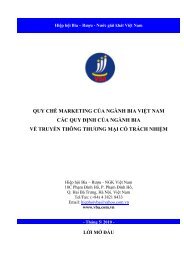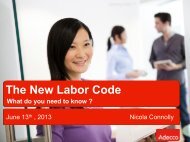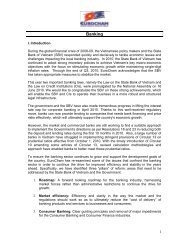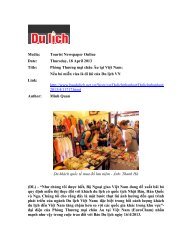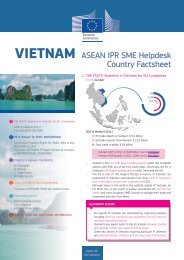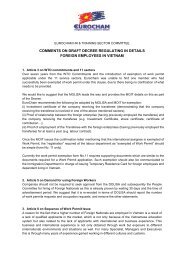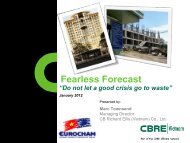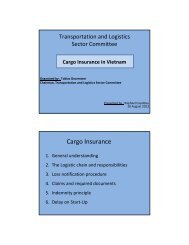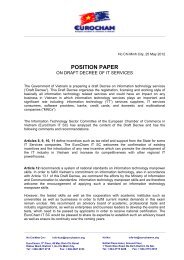ASEAN MUTUAL RECOGNITION ARRANGEMENT ON TOURISM ...
ASEAN MUTUAL RECOGNITION ARRANGEMENT ON TOURISM ...
ASEAN MUTUAL RECOGNITION ARRANGEMENT ON TOURISM ...
Create successful ePaper yourself
Turn your PDF publications into a flip-book with our unique Google optimized e-Paper software.
Executive summaryIn 2015, the <strong>ASEAN</strong> Economic Community will come into being, with one of its keyelements being the mutual recognition of professional qualifications within theCommunity. The <strong>ASEAN</strong> Mutual Recognition Arrangement on Tourism Professionals (MRA-TP) is one forward-looking initiative designed to enable the mobility of employment forskilled tourism labour within each Member State. The key to this arrangement isrecognition of skills and qualifications of working tourism professionals from different<strong>ASEAN</strong> countries.In order to function effectively, the MRA - TP requires an infrastructure operating at boththe <strong>ASEAN</strong> and Member State level. The <strong>ASEAN</strong> Framework Agreement on MRAs (1998) andthe <strong>ASEAN</strong> MRA on Tourism Professionals (2009) provides guidance for these mechanisms,and draws on the experience and expertise available through the development of otherMRAs internationally.This Handbook has been produced as an essential reference to the key policies, processesand implementation guidelines for the MRA – TP, and is provided for National TourismOrganizations in <strong>ASEAN</strong>. It can be disseminated to staff within NTOs who are responsiblefor manpower planning, HRD, training and qualifications.Recognition & Eligibility of Foreign Tourism ProfessionalsThe <strong>ASEAN</strong> MRA on Tourism Professionals will provide a mechanism for agreement on theequivalence of tourism certification procedures and qualifications across <strong>ASEAN</strong>. When<strong>ASEAN</strong> nations mutually recognise each other’s qualifications this will encourage a freeand open market for tourism labour across the region and boost the competitiveness ofthe tourism sector in each <strong>ASEAN</strong> nation, while at the same time attracting needed talentto meet local skills shortages. The eligibility to work in a host country will of course besubjected to prevailing domestic laws and regulations of the host country.In order for a Foreign Tourism Professional to be recognised by other <strong>ASEAN</strong> MemberStates and to be eligible to work in a host country, they will need to possess a validtourism competency certificate in a specific tourism job title as specified in the Common<strong>ASEAN</strong> Tourism Curriculum (CATC), issued by the Tourism Professional Certification Board(TPCB) in an <strong>ASEAN</strong> Member State.It is important to recognise that while the MRA on Tourism Professionals will be active,the application and implementation by the various tourism educational and trainingproviders in each country will be voluntary. This is especially true in terms of quality ofinstruction, evaluation and standards of curriculum development.The Key MRA ComponentsThe MRA – TP model consists of six mechanisms or components:P a g e | 1



